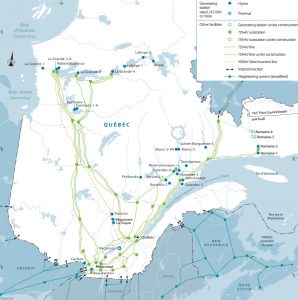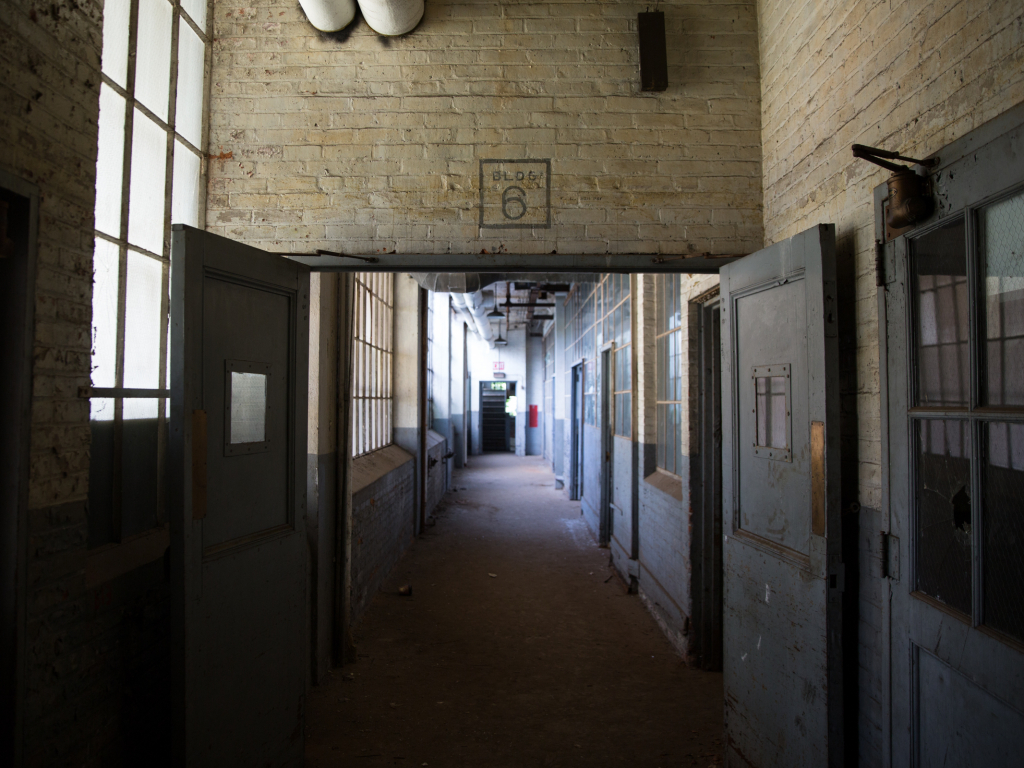Episode 82: The Other End of the Line (Updated)

This week, some favorites from the archive: From north of the border comes a fascinating story of land disputes, French Canadian pride, and massive dams that are set to supply more power to the New England grid. We also tour an old Hartford factory that’s preparing for a new life as a food and jobs hub for a struggling neighborhood. And we get a taste of what’s new about New England food.

Hydro-Quebec’s Daniel-Johnson Dam and Manicoucagan Reservoir seen from a helicopter. Photo by Hannah McCarthy for NHPR
The Power Up North
New England has aggressive goals for renewable energy, but high energy costs here push us towards a balance between the cleanest sources, and the least expensive. Nuclear and natural gas account for the biggest chunk of our energy production currently. As we’ve reported, Massachusetts is reviewing proposals for offshore wind energy projects that could be the first of their size in the country. But increasingly, policymakers and utilities are looking at our neighbors to the north.

A map provided by Hydro-Quebec shows existing dams, transmission lines, and projects under construction.
A vast network of hydroelectric dams powers the province of Quebec, with plenty of inexpensive energy to spare. These dams belong to Hydro-Quebec, an electric company owned by the Quebec government. They supply about ten percent of the power used by the New England grid.
Several of these proposals for new transmission lines that would connect New England with Canadian hydro were among the bids for a twenty-year renewable energy contract with the state of Massachusetts. At the end of January Massachusetts picked just one project – the Northern Pass – a power line that would cut north to south across much of New Hampshire, owned and operated by Eversource.
Dedicated listeners know what happened next. A week later, an early decision by New Hampshire Site Evaluation Committee brought those plans to a halt (and delayed the release of Episode 79 by a day as we scrambled to produce an update!) The committee denied Eversource a permit for the project because it would “unduly affect the orderly development of the region.”
With Eversource about to head into an extensive appeals process, Massachusetts announced last week that the state will begin negotiations on another project to connect to Quebec’s hydro power- this time in Maine.
So it seems very likely, sooner or later, New England will be doing more business with Hydro-Quebec. But that company’s story includes a struggle over economic power, ancestral lands, and cultural pride that cuts deep in Quebec.
Reporters Sam Evans-Brown and Hannah McCarthy traveled up north to bring that extraordinary tale back. If you haven’t listened yet, now is a great time to catch up on “Powerline,” a special series from the NHPR podcast Outside/In that dives deep into the history Hydro-Quebec and its clashes with native tribes. Sam and Hannah joined us to discuss what they learned.
Turning Over a New Leaf
Many New England cities used to be manufacturing hubs. Workers lived near where they worked and supported the other businesses that sprung up around them.
Today, old factories are puzzles to solve. Some retain a bit of small manufacturing — others are converted into high-end lofts, artists’ studios, and even world-class art museums, like MassMoCA in North Adams, Massachusetts.
The Swift Factory building is tucked into a residential section of Hartford’s Northeast neighborhood.
Gold leaf, a thin, paper-like gold product, was manufactured there for over 100 years. Leaf produced at Swift adorned the dome atop the Connecticut capitol building and decorated the lettering on the sides of local fire trucks.
The company was owned by a white family, the Swifts. And the neighborhood, which had mostly white immigrant residents early in the 1900s, gradually became African-American and West Indian. It still is today.
The Swift Factory closed in 2005. A nonprofit called Community Solutions took ownership in 2010 and surveyed the neighborhood to figure out what to do with the site.
Sometimes, a factory renovation can be an early sign of gentrification. But the plans for this particular building are a response to the needs and desires of the people already living here, representatives say. On a factory tour last summer, we learned about what’s to come. We also got a sense of what factory life was like from a woman who experienced it firsthand.
Fresh Perspectives on New England Cuisine
“Local” has become the most important word in the world of New England food. “Local” grass-fed beef, locally-made sheep’s milk cheese, or restaurants that proudly list the names of local farmers that grow their food are all a growing part of this movement.
Amy Traverso is senior food editor for Yankee Magazine and NewEngland.com, and she’s been watching these trends. She’s an expert in New England food, and an advocate for it. Traverso is also in charge of giving out Yankee Magazine’s annual Editor’s Choice Food Awards. Below: the 2017 winners.
Traverso says chefs and food producers are challenging the notion of New England’s traditional foods. She’s covering new spins on classic dishes: lobster on black rice with brown butter aioli and baked beans with pomegranate molasses. We spoke with her last fall.
About NEXT
NEXT is produced at WNPR.
Host: John Dankosky
Producer: Andrea Muraskin
Executive Producer: Catie Talarski
Contributors to this episode: Sam Evans-Brown, Hannah McCarthy
Music: Todd Merrell, “New England” by Goodnight Blue Moon, “Like a Ship” by T.L. Barnett and the Youth for Christ Choir, “Adapt and Prosper” by Akrobatic
We appreciate your feedback! Send critique, suggestions, praise, questions, story ideas, and flakes of gold leaf to next@wnpr.org.





